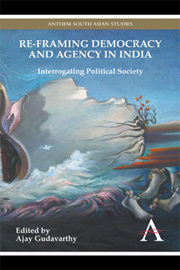Book contents
- Frontmatter
- Contents
- Preface and Acknowledgements
- List of Tables
- Chapter 1 Introduction: Why Interrogate Political Society?
- Part I Political Society and Protest Politics
- Part II Political Society, Middlemen and Mobility
- Part III Civil Society and/or Political Society
- Part IV Rejoinder
- Chapter 14 The Debate over Political Society
- List of Contributors
Chapter 14 - The Debate over Political Society
from Part IV - Rejoinder
Published online by Cambridge University Press: 05 June 2012
- Frontmatter
- Contents
- Preface and Acknowledgements
- List of Tables
- Chapter 1 Introduction: Why Interrogate Political Society?
- Part I Political Society and Protest Politics
- Part II Political Society, Middlemen and Mobility
- Part III Civil Society and/or Political Society
- Part IV Rejoinder
- Chapter 14 The Debate over Political Society
- List of Contributors
Summary
Ever since the idea was formulated some fifteen years ago, political society as redefined in the context of post-colonial democracy has acquired a life of its own. Scholars who have found the idea useful have retooled it to serve their own purposes. Others have protested that it confuses matters and misleads inquiry, or worse, that it is seriously mistaken in its theoretical grounding. I have regarded all these discussions as extremely gratifying and have, over the years, found myself responding to the debates, learning from my interlocutors and clarifying the idea for better analytical use. The essays collected in this volume are serious engagements with the concept of political society in the theoretical as well as the empirical domains. I greatly appreciate this opportunity to re-examine the concept from so many different angles and to respond, not polemically, but in a spirit of shared intellectual concern, even if it means having to mark out differences in theoretical perspective and political choice.
It may be useful to recall the circumstances in the 1990s when the idea was formulated. It was the time, of course, of the so-called liberalization of the Indian economy, but the intellectual world in India was then far more passionately involved in the debates over secularism. I became associated at the time in some field research in Kolkata on workers in the informal sector and inhabitants of squatter colonies.
- Type
- Chapter
- Information
- Re-framing Democracy and Agency in IndiaInterrogating Political Society, pp. 305 - 322Publisher: Anthem PressPrint publication year: 2012
- 5
- Cited by



